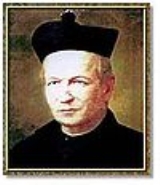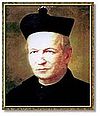
Franz Xavier Wernz
Encyclopedia

Superior General of the Society of Jesus
The Superior General of the Society of Jesus is the official title of the leader of the Society of Jesus—the Roman Catholic religious order, also known as the Jesuits. He is generally addressed as Father General. The position carries the nickname of Black Pope, after his simple black priest's...
. He was born in Rottweil
Rottweil
Rottweil is a town in the south west of Germany and is the oldest town in the federal state of Baden-Württemberg.Located between the Black Forest and the Swabian Alb hills, Rottweil has about 25,000 inhabitants...
, Württemberg
Württemberg
Württemberg , formerly known as Wirtemberg or Wurtemberg, is an area and a former state in southwestern Germany, including parts of the regions Swabia and Franconia....
(afterwards part of Germany
Germany
Germany , officially the Federal Republic of Germany , is a federal parliamentary republic in Europe. The country consists of 16 states while the capital and largest city is Berlin. Germany covers an area of 357,021 km2 and has a largely temperate seasonal climate...
).
Father Wernz was the first of the eight children of parents with deep faith and piety. From an early age he had expressed his desire to be a Jesuit, perhaps influenced by the fact that his parish church in Rottweil
Rottweil
Rottweil is a town in the south west of Germany and is the oldest town in the federal state of Baden-Württemberg.Located between the Black Forest and the Swabian Alb hills, Rottweil has about 25,000 inhabitants...
had been a Jesuit church before the suppression and still retained many reminders of the Society. The paintings of many Jesuit Saints and the fact that the yearly parish mission was given by Jesuits had probably helped him to make the decision. He entered the Society on December 5, 1857, made his novitiate
Novitiate
Novitiate, alt. noviciate, is the period of training and preparation that a novice monastic or member of a religious order undergoes prior to taking vows in order to discern whether they are called to the religious life....
at Gorheim near Sigmaringen
Sigmaringen
Sigmaringen is a town in southern Germany, in the state of Baden-Württemberg. Situated on the upper Danube, it is the capital of the Sigmaringen district....
, and took his first Vows on December 8, 1859. From 1864-1868 and from 1872-1873 he was educator and teacher at Stella Matutina (Jesuit School)
Stella Matutina (Jesuit school)
Stella Matutina in Feldkirch, Austria, was a Jesuit school from 1651–1773 and from 1856-1979.- Short history:The “Kolleg” began in 1649 but opened formally in 1651. In 1773, when Pope Clement XIV discontinued the order of the Society of Jesus, the school closed...
in Feldkirch, Austria. He studied theology
Theology
Theology is the systematic and rational study of religion and its influences and of the nature of religious truths, or the learned profession acquired by completing specialized training in religious studies, usually at a university or school of divinity or seminary.-Definition:Augustine of Hippo...
and philosophy
Philosophy
Philosophy is the study of general and fundamental problems, such as those connected with existence, knowledge, values, reason, mind, and language. Philosophy is distinguished from other ways of addressing such problems by its critical, generally systematic approach and its reliance on rational...
at the Maria Laach
Maria Laach Abbey
Maria Laach Abbey is a Benedictine abbey situated on the southwestern shore of the Laacher See , near Andernach, in the Eifel region of the Rhineland-Palatinate in Germany. It is a member of the Beuronese Congregation within the Benedictine Confederation...
and Aachen
Aachen
Aachen has historically been a spa town in North Rhine-Westphalia, Germany. Aachen was a favoured residence of Charlemagne, and the place of coronation of the Kings of Germany. Geographically, Aachen is the westernmost town of Germany, located along its borders with Belgium and the Netherlands, ...
Abbys. When the Kulturkampf
Kulturkampf
The German term refers to German policies in relation to secularity and the influence of the Roman Catholic Church, enacted from 1871 to 1878 by the Prime Minister of Prussia, Otto von Bismarck. The Kulturkampf did not extend to the other German states such as Bavaria...
of Chancellor
Chancellor
Chancellor is the title of various official positions in the governments of many nations. The original chancellors were the Cancellarii of Roman courts of justice—ushers who sat at the cancelli or lattice work screens of a basilica or law court, which separated the judge and counsel from the...
Bismarck
Otto von Bismarck
Otto Eduard Leopold, Prince of Bismarck, Duke of Lauenburg , simply known as Otto von Bismarck, was a Prussian-German statesman whose actions unified Germany, made it a major player in world affairs, and created a balance of power that kept Europe at peace after 1871.As Minister President of...
expelled the Jesuits from Germany
Germany
Germany , officially the Federal Republic of Germany , is a federal parliamentary republic in Europe. The country consists of 16 states while the capital and largest city is Berlin. Germany covers an area of 357,021 km2 and has a largely temperate seasonal climate...
, the exiled scholastics, after a short stay at Stella Matutina (Jesuit School)
Stella Matutina (Jesuit school)
Stella Matutina in Feldkirch, Austria, was a Jesuit school from 1651–1773 and from 1856-1979.- Short history:The “Kolleg” began in 1649 but opened formally in 1651. In 1773, when Pope Clement XIV discontinued the order of the Society of Jesus, the school closed...
, found refuge in the Jesuit College, Ditton Hall in Lancashire
Lancashire
Lancashire is a non-metropolitan county of historic origin in the North West of England. It takes its name from the city of Lancaster, and is sometimes known as the County of Lancaster. Although Lancaster is still considered to be the county town, Lancashire County Council is based in Preston...
in England
England
England is a country that is part of the United Kingdom. It shares land borders with Scotland to the north and Wales to the west; the Irish Sea is to the north west, the Celtic Sea to the south west, with the North Sea to the east and the English Channel to the south separating it from continental...
and, finally, in 1881 moved to St. Bueno's in Wales
Wales
Wales is a country that is part of the United Kingdom and the island of Great Britain, bordered by England to its east and the Atlantic Ocean and Irish Sea to its west. It has a population of three million, and a total area of 20,779 km²...
. After a year of private study he became Professor of Canon Law
Canon law
Canon law is the body of laws & regulations made or adopted by ecclesiastical authority, for the government of the Christian organization and its members. It is the internal ecclesiastical law governing the Catholic Church , the Eastern and Oriental Orthodox churches, and the Anglican Communion of...
at Ditton Hall and later at St. Bueno's. Between 1882 and 1906 he taught Canon Law
Canon law
Canon law is the body of laws & regulations made or adopted by ecclesiastical authority, for the government of the Christian organization and its members. It is the internal ecclesiastical law governing the Catholic Church , the Eastern and Oriental Orthodox churches, and the Anglican Communion of...
at the Gregorian University
Pontifical Gregorian University
The Pontifical Gregorian University is a pontifical university located in Rome, Italy.Heir of the Roman College founded by Saint Ignatius of Loyola over 460 years ago, the Gregorian University was the first university founded by the Jesuits...
, the last two years spent there he also served as its Rector
Rector
The word rector has a number of different meanings; it is widely used to refer to an academic, religious or political administrator...
.
After the death of Father Martín
Luis Martín
Luis Martín García was a Spanish Jesuit, elected the 24th Superior General of the Society of Jesus.-Early years and formation:...
, the Vicar General
Vicar general
A vicar general is the principal deputy of the bishop of a diocese for the exercise of administrative authority. As vicar of the bishop, the vicar general exercises the bishop's ordinary executive power over the entire diocese and, thus, is the highest official in a diocese or other particular...
summoned a Congregation for August 31, 1906, but it began after a day's postponement on September 1 and would last until October 18. On the third ballot taken on September 8, the 64-year-old Wernz was elected General.
During his generalate he vigorously promoted the spiritual life, opened missions and created provinces in all parts of the world. The whole continent of North America
North America
North America is a continent wholly within the Northern Hemisphere and almost wholly within the Western Hemisphere. It is also considered a northern subcontinent of the Americas...
was one of his special interests and he approved the setting up of provinces, houses, and colleges the length and breadth of that vast territory. Father Martín
Luis Martín
Luis Martín García was a Spanish Jesuit, elected the 24th Superior General of the Society of Jesus.-Early years and formation:...
had set up the famous Monumenta Historica and Wernz continued his support and encouraged Jesuit writers to take up this important work, which they did with enthusiasm. He was instrumental in the founding of the Jesuit periodicals "Voces e Maria ad Lacum" which became "Stimmen der Zeit
Stimmen der Zeit
Stimmen der Zeit is a monthly German magazine published since 1865 by Herder publishers. Its subtitle is Zeitschrift für christliche Kultur, and it publishes articles on Christian culture in the broad sense of the word...
" in Germany
Germany
Germany , officially the Federal Republic of Germany , is a federal parliamentary republic in Europe. The country consists of 16 states while the capital and largest city is Berlin. Germany covers an area of 357,021 km2 and has a largely temperate seasonal climate...
and another, "Przeglad Powszechny," in Poland
Poland
Poland , officially the Republic of Poland , is a country in Central Europe bordered by Germany to the west; the Czech Republic and Slovakia to the south; Ukraine, Belarus and Lithuania to the east; and the Baltic Sea and Kaliningrad Oblast, a Russian exclave, to the north...
.
One of his last letters written on December 25, 1913 to the Society was on the celebration of the centenary of the Society's restitution, to take place the following year.
Wernz had been General for seven years and eleven months, from September 8, 1906 until he died on August 19, 1914. His death occurred only a few hours before that of Pope Pius X
Pope Pius X
Pope Saint Pius X , born Giuseppe Melchiorre Sarto, was the 257th Pope of the Catholic Church, serving from 1903 to 1914. He was the first pope since Pope Pius V to be canonized. Pius X rejected modernist interpretations of Catholic doctrine, promoting traditional devotional practices and orthodox...
and a mere three weeks after the outbreak of the First World War. It would be a difficult time for his successor to begin leading an international Society in a world internationally shattered.
His tomb can be found in the Jesuit Mausoleum at the Roman Campo Verano cemetery.

